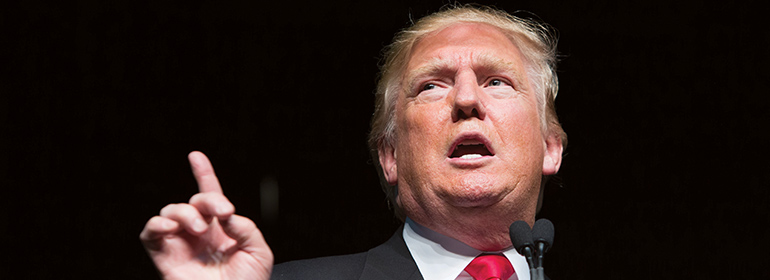With the civil liberties we take for granted at risk in today’s uncertain political climate, resistance against the right is how we can protect them
In January, as Donald Trump got down to the business of eroding personal freedoms immediately after his inauguration, the French presidential hopeful Marine Le Pen headlined a European gathering of far-right leaders in Germany. It’s become clear that we’re in the midst of a new global era where the rights we’ve gained can’t be taken for granted, and resistance must at the core of the way forward for humanity.
On February 2, Donald Trump warned the assembled guests at the National Prayer Breakfast – an annual event described as ‘an acknowledgement of the role of faith in American public life’ – that freedom of religion, a “sacred” right was under threat. “The world is under serious, serious threat in so many different ways,” he said, “but we’re going to straighten it out.”
He went on to announce plans to “totally destroy” the Johnson Amendment, a provision of the tax code prohibiting religious leaders and organisations from endorsing (or opposing) political candidates. With that amendment gone, churches would be free to (openly) nancially support or advocate for their preferred candidates.
Religious Freedom Executive Order
Later that same day, a draft of a proposed executive order was leaked to The Washington Post. The order, titled ‘Establishing a Government-Wide Initiative to Respect Religious Freedom’, laid out several beliefs – those most often closely associated with conservative Christians – as worthy of protection, namely: opposition to abortion, homosexuality, same-sex marriage and the notion that gender and anatomy are separate entities.
Such a bill would not only overwrite existing legislative protections, but would in essence grant government and private sector employees the freedom to refuse services – a wedding cake, a driving license, contraception – to anyone who is perceived to offend their religious beliefs.

Days later the proposal was quashed (reportedly as a result of intervention by left-leaning Ivanka Trump and husband Jared Kushner) but Trump’s appeal to Religious Nationalism doesn’t bode well for the future. Even if the announcement of plans to do away with the Johnson Amendment were an attempt to solicit the affections of the evangelical right as part of a cynical, albeit forward-looking re-election strategy, it is still troubling; at best it shows him to be a pragmatic populist who will say whatever it takes to be elected/re-elected, at worst, as a bigot.
Resist Trump’s Agenda
In a subsequent interview Vice President Mike Pence refused to rule out the introduction of a similar bill in the future. “Whether that executive order is followed through on in the next three months or the next six months, whether it’s published or not, the administration intend to do the stuff that is set out in that order, and that’s what we have to watch out for now,” warns Amnesty International Ireland’s Colm O’Gorman.
“I believe that regardless of whether or not it comes in as an executive order, that’s this administration’s agenda. That’s what we’re now on notice of and that’s what we have to resist.”
Whatever the truth, Trump has already begun to erode the freedoms of ‘illegal’ LGBTs and those seeking the safety of American shores with his attempt to ban immigration from seven predominantly muslim countries. More worryingly, it is part of what seems like a global lurch to the right.
Europe’s Far Right
Economic stagnation and a global refugee crisis has seen far-Right parties garner electoral successes closer to home in Europe. In 2016 alone Norbert Hofer of Austria’s nationalist and anti-immigration Freedom Party (motto: ‘Austria first’) received 49.7 percent of the vote in the country’s presidential election; Germany’s AfD party won 25 percent of the vote in March’s state elections; even in utopian Sweden the far-Right Sweden Democrats are the third-largest party in the country’s Riksdag, with 49 seats; Holland’s Party for Freedom, headed by Trump-alike Geert Wilders, is expected to make significant gains in March’s upcoming election.
At the beginning of the year a summit of Europe’s right-wing populist parties was convened in Koblenz, Germany, in what organisers said was an attempt to “strengthen connections between Europe’s populist parties”.
Empowered, or rather emboldened, by the success of Brexit and the election of Donald Trump, Marine Le Pen told assembled crowds: “2016 was the year the Anglo- Saxon world woke up. I am certain 2017 will be the year when the people of continental Europe wake up”.
Ireland’s Healthy Attitudes
Thankfully attempts to establish similar parties in this country have been (so far) unsuccessful.
2015 saw the founding of Identity Ireland, an anti-EU group which “stands up for the Irish Republic and the Irish citizen”, though the group has yet to secure any seats in the Dáil.
In November of last year, Dublin’s Merrion Hotel cancelled a press conference by the National Party, a newly-established right-wing party founded by former Youth Defence activist Justin Barrett, after a barrage of complaints from the public. Barrett’s ‘party’ which claimed to speak for the “silent majority who have seen the beginnings of ‘multi-culturalism’ with growing dismay”, have been largely silent ever since.
The failure of the these parties to gain a meaningful hold in Irish politics is something Irish Council for Civil Liberties Executive Director Liam Herrick attributes to the “healthy and positive attitudes” most Irish people have towards diversity, together with our strong record of anti-racist and anti-fascist activism. “But we should not be complacent,” adds Herrick. “I believe that the Irish media gives disproportionate and insufficiently critical air time to far-right views on some issues. The interpretation of what constitutes ‘balance’ can be problematic.”
While it could be pointed out that right-Wing parties often explode due to acrimony and in-fighting (the BNP springs to mind), the threat posed by the right-wing populism has taken on a new seriousness since the election of Trump. For the reason why, we must only look to the (relatively) recent past.
Berlin’s Gay Subculture
For an example of how quickly things can change, let us cast our minds back to Berlin in the 1920-30s. In the time period that followed World War I and preceded WWII, a gay subculture flourished. There was an active community which was visible and vital to the landscape of the city. Gay publications (the earliest of which, Der Eigene, was first published in 1896) were sold at news kiosks and even attracted ‘mainstream’ advertisers eager to engage with the gay community.

Although there was an anti-sodomy statute criminalising same-sex acts between men, it was unenforced. The only way a conviction could be secured was if there was a confession, or witness testimony, and since no-one was likely to confess, such ‘crimes’ were largely unprotected.
The police commissioner of the time, Leopold von Meerscheidt-Hüllessem, took an extremely enlightened, ‘hands-off’ approach to Berlin’s gay community; gay bars, cafés and cabarets were monitored by the police but no attempts were made to prosecute patrons. This gay subculture flourished right up until the rise of the Nazi regime. But how quickly things can change: in 1929, the German parliament, the Reichstag, moved toward the decriminalisation of homosexuality (the stock market crash prevented a final vote on the matter) but by 1935, the National Socialists had introduced a law criminalising homosexual fraternisation. Between 1933-1945 an estimated 100,000 gay men were arrested. 50,000 of those were convicted and of those, between 10-15,000 were sent to concentration camps. An estimated 60 percent were murdered.
Solidarity Has Never Been More Important
The lesson in all this is that freedoms, even hard-won freedoms like the ability to marry
the partner of one’s choosing or to live in one’s the partner of one’s choosing or to live in one’s
preferred gender, the can be rescinded if political circumstances contrive to make it so.
It is for this reason that solidarity has never been more important, according to Herrick.
“The Irish Marriage Equality referendum made a major impression on US public opinion, and international pressure will be equally important in the fight to resist any regressive measures against the LGBT community in the coming years. Whatever the White House thinks, the struggle for equality and human rights knows no borders.”
Amnesty’s O’Gorman agrees. “It’s essential that we stand in solidarity with activists and others
in the United States – and this isn’t limited to the United States, look at elements of what le Pen
says in France, and what other right-wing populist says in France, and what other right-wing populist
parties are saying across Europe.
“It’s not a uniquely American phenomenon, “It’s not a uniquely American phenomenon, so those of us who are concerned about, and so those of us who are concerned about, and advocate for, equality and human rights for all advocate for, equality and human rights for all people, it’s the assault on this we have to resist. people, it’s the assault on this we have to resist. We need to become a truly global movement of resistance.”
(Image: By Lotse (Own work) [GFDL or CC BY-SA 3.0], via Wikimedia Commons
© 2017 GCN (Gay Community News). All rights reserved.
